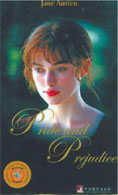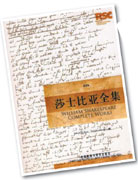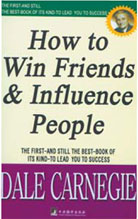Say you're a lover of literary classics and are about to set off for China for an extended stay. You may want to have your favorite books at your fingertips.
Choice one: Lug a big trunk across the oceans. Choice two: Buy an electronic gadget, such as the Amazon Kindle, and download hundreds of books.
But if you don't want to strain your eyes, your back and your budget, here is the third choice: Buy the books in China - at a fraction of the cost in a Western country.
More and more classics are in print in China - and I'm not talking about Chinese translations. Chinese publishers are increasingly turning to classics in the English language to give readers a taste of authenticity.

If you want a copy of Pride and Prejudice, you can choose any one of half-a-dozen editions, some of which are in bilingual format with Chinese translations. The one by the Central Compilation & Translation Press (CCTP) has sold 5,500 copies since it came out in September last year, a better performance than an average novel by an unknown Chinese author.
China has hundreds of millions of people who are learning English and this has created a huge market for teaching and supplementary materials. But a select group also wants to read English for itself, for the beauty of the language and the undertones it carries.
Bai Yansong, a noted television anchorman, has reportedly said he no longer reads English-language books in translation.
No matter how good a translation, nuances can be lost in the process of converting one language to another. Besides, what's the point of spending years learning English and not be able to savor the works of Jane Austen or William Shakespeare the way they were penned?
But how big is this market? Nobody seems to have a clear idea.
Publishers are constantly caught in a dilemma of having to choose between authenticity and practicality. "Book lovers may spend several times more for an imported edition because they think ours is not bona fide enough," says Zheng Ying, an editor with CCTP.
So, they have adopted a page layout and typography that replicates the original books and kept the Chinese title so small that it's inconspicuous. "We thought of doing away with the Chinese title so that the only telltale sign it's published in China is the edition notice."
But college students do not really read classics, says Wang Qiuhai, a professor of English language at Capital Normal University. "They just learn of the titles. They may browse a little bit to get through certain courses."
To lure the not-quite-proficient, many publishers resort to a number of aids: insertion of notes to explain, in Chinese, the difficult words and phrases; selection of light materials that use a limited vocabulary; and finally, a side-by-side Chinese translation to ease the pain of constantly looking up a dictionary.
A bilingual format can work brilliantly if a book is not too long and the English and Chinese versions complement each other by not only providing a comparative study of the same text but also working toward a cross-cultural bond.
A Christmas Memory by Truman Capote and De Profundis by Oscar Wilde, both published by Yilin Press, benefit from their limited length. The latter even includes an audio highlight, again in both languages, which enhances the reading experience. A Short History of Chinese Philosophy by Fung Yu-lan, originally written in English, now has a two-volume bilingual edition from the Tianjin Academy of Social Sciences Press, which is all the more valuable because of the hard-to-decipher Chinese concepts.
There are those who believe that highlights rather than complete works should be published for this large demographic. "If a textbook uses selections from a book, it can drive up the sale of that book," says Chen Yimei, a  high-school teacher in Beijing. But she suggests that longer selections be used as a stepping stone, without intimidating younger students.
high-school teacher in Beijing. But she suggests that longer selections be used as a stepping stone, without intimidating younger students.
Relevancy of subject matter poses another challenge. "If you come out with a biography of Yao Ming instead of Helen Keller, youngsters would be more likely to buy it," says Chen. But the reason for the preference of the old over the new is copyright. Helen Keller is not just a classic but is also in the public domain while the Yao Ming story is neither.
And Western copyright holders are often reluctant to grant the right for fear of encroaching on the sales of the exported edition. According to Li Wei, a manager of distribution at CCTP, a book without copyright costs one quarter as much when published in China.
That actually hints at the possibility of an overseas market. In the US, a classic like Pride and Prejudice sells tens of thousands of copies each year. A new Penguin edition sold 4,500 copies a month, according to a 2003 New York Times report.
To achieve an international standard, many publishers are taking pains to make sure no detail is ignored. For example, typesetting software in a Chinese-language environment tends to render many English punctuation marks into strange symbols. An apostrophe, for example, becomes a blank space. Han Huiqiang, a senior editor at CCTP, pays special attention to such details.
Han and his colleagues also strive to balance uniformity and customization. They have put out a series of famous biographies, another of novels, including Jane Eyre, Wuthering Heights, Tess of the d'Urbervilles and Gone with the Wind, and one more of non-fiction. But instead of a one-size-fits-all layout that's easy for promotion, they have opted for the one-book, one-design approach.
Jane Austen has a dust jacket and purple headers and footers with elegant flower patterns, with an eye on women readers. Aesop's Fables, on the other hand, has sepia illustrations and pop-up axioms that help it target a younger readership. Dale Carnegie's How to Win Friends & Influence People, a bestseller with 30,000 copies sold in Shenzhen alone, looks so much like a Western paperback that a Western reader may not even notice the miniscule Chinese logo of the publisher on the cover. (The Chinese title appears on a detachable "cover belt".)
Compared with the 1,300-title Penguin classics library, offerings by Chinese publishers are relatively small. But if they happen to be what an expat fancies, they can be delivered to your doorstep without a charge, and with an extra tool for language learning in the case of a bilingual edition.
(China Daily April 22, 2009)